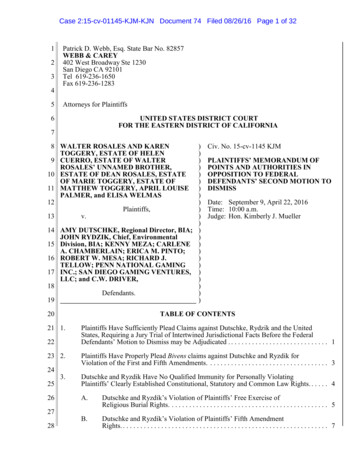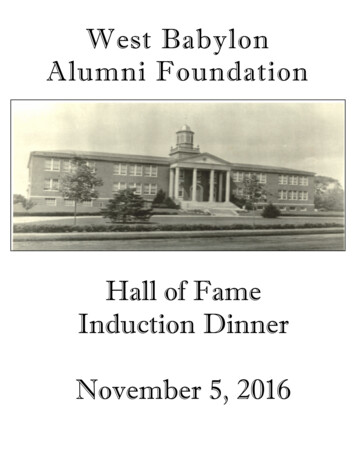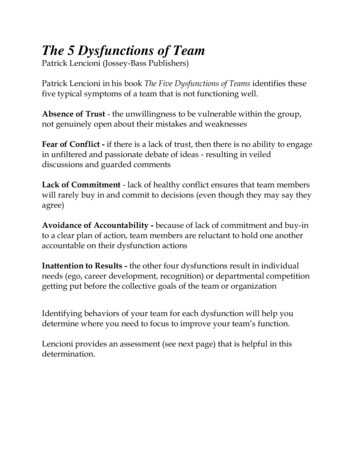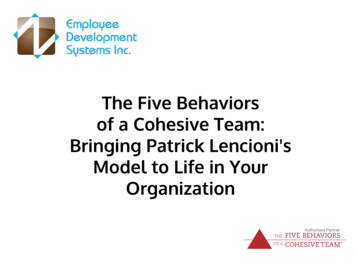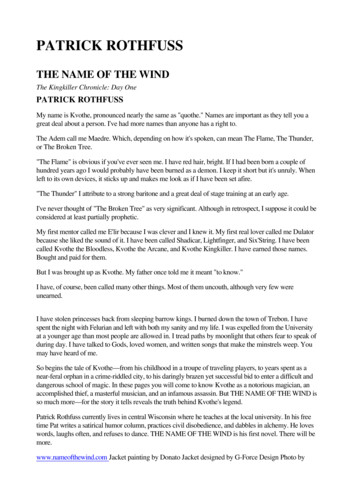
Transcription
PATRICK ROTHFUSSTHE NAME OF THE WINDThe Kingkiller Chronicle: Day OnePATRICK ROTHFUSSMy name is Kvothe, pronounced nearly the same as "quothe." Names are important as they tell you agreat deal about a person. I've had more names than anyone has a right to.The Adem call me Maedre. Which, depending on how it's spoken, can mean The Flame, The Thunder,or The Broken Tree."The Flame" is obvious if you've ever seen me. I have red hair, bright. If I had been born a couple ofhundred years ago I would probably have been burned as a demon. I keep it short but it's unruly. Whenleft to its own devices, it sticks up and makes me look as if I have been set afire."The Thunder" I attribute to a strong baritone and a great deal of stage training at an early age.I've never thought of "The Broken Tree" as very significant. Although in retrospect, I suppose it could beconsidered at least partially prophetic.My first mentor called me E'lir because I was clever and I knew it. My first real lover called me Dulatorbecause she liked the sound of it. I have been called Shadicar, Lightfinger, and Six'String. I have beencalled Kvothe the Bloodless, Kvothe the Arcane, and Kvothe Kingkiller. I have earned those names.Bought and paid for them.But I was brought up as Kvothe. My father once told me it meant "to know."I have, of course, been called many other things. Most of them uncouth, although very few wereunearned.I have stolen princesses back from sleeping barrow kings. I burned down the town of Trebon. I havespent the night with Felurian and left with both my sanity and my life. I was expelled from the Universityat a younger age than most people are allowed in. I tread paths by moonlight that others fear to speak ofduring day. I have talked to Gods, loved women, and written songs that make the minstrels weep. Youmay have heard of me.So begins the tale of Kvothe—from his childhood in a troupe of traveling players, to years spent as anear-feral orphan in a crime-riddled city, to his daringly brazen yet successful bid to enter a difficult anddangerous school of magic. In these pages you will come to know Kvothe as a notorious magician, anaccomplished thief, a masterful musician, and an infamous assassin. But THE NAME OF THE WIND isso much more—for the story it tells reveals the truth behind Kvothe's legend.Patrick Rothfuss currently lives in central Wisconsin where he teaches at the local university. In his freetime Pat writes a satirical humor column, practices civil disobedience, and dabbles in alchemy. He loveswords, laughs often, and refuses to dance. THE NAME OF THE WIND is his first novel. There will bemore.www.nameofthewind.com Jacket painting by Donato Jacket designed by G-Force Design Photo by
Jamie RothfussAdvance quotes for THE NAME OF THE WIND:"THE NAME OF THE WIND marks the debut of a writer we would all do well to watch. PatrickRothfuss has real talent, and his tale of Kvothe is deep and intricate and wondrous." —Terry Brooks,22-time New York Times bestselling author"THE NAME OF THE WIND has everything fantasy readers like, magic and mysteries and ancient evil,but it's also humorous and terrifying and completely believable. As with all the very best books in ourfield, it's not the fantasy trappings (wonderful as they are) that make this novel so good, but what theauthor has to say about true, common things, about ambition and failure, art, love, and loss." —TadWilliams New York Times bestselling author of Shadowmarch, Otherland, and Memory, Sorrow andThorn"Hail Patrick Rothfuss! A new giant is striding the land. THE NAME OF THE WIND is an astonishingnovel that just happens to be the writer's first. The bestsellers' lists and the award ballots are beckoningtoward Rothfuss, and readers will be clamoring for more of the riveting life story of Kvothe. Bravo, I say!Bravo!"—Robert J. Sawyer, Hugo Award-winning author of Rollback"Patrick Rothfuss gives us a fabulous debut, standing firmly on the main stage of the fantasy genre andneeding no warm-up act. Jordan and Goodkind must be looking nervously over their shoulders!"—Kevin J. Anderson, New York Times bestselling coauthor of Hunters of Dune"THE NAME OF THE WIND is a rare find these days, fit for lovers of fantasy and newcomers to thegenre alike. It fires the imagination and stirs the heart. In Pat Rothfuss's sure hands, the reader willexperience a journey to the very heights of fantasy. I for one never wanted to come back down." —SeanWilliams, New York Times bestselling author of The Blood DebtTHE NAME OF THE WINDTHE NAME OF THE WINDTHE KINGKILLER CHRONICLE: DAY ONEPATRICK ROTHFUSSDAW BOOKS, INC.DONALD A. WOLLHEIM, FOUNDER 375 Hudson Street, New York, NY 10014 ELIZABETH R.WOLLHEIM SHEILA E. GILBERT PUBLISHERS http://www.dawbooks.comCopyright 2007 by Patrick RothfussAll rights reserved. Jacket art by Donato. DAW Books Collectors No. 1396. DAW Books aredistributed by Penguin Group (USA) Inc.Book designed by Elizabeth Glover. Maps by Nathan Taylor www.king-sheep.comAll characters and events in this book are fictitious.All resemblance to persons living or dead is coincidental.The scanning, uploading and distribution of this book via the Internet or any other means without thepermission of the publisher is illegal, and punishable by law. Please purchase only authorized electronic
editions, and do not participate in or encourage the electronic piracy of copyrighted materials. Yoursupport of the author's rights is appreciated.First Hardcover Printing, April 2007.DAW TRADEMARK REGISTERED U.S. PAT. OFF. AND FOREIGN COUNTRIES —MARCAREGISTRADA HECHO EN U.S.A.PRINTED IN THE U.S.A.To my mother, who taught me to love books and opened the door to Narnia, Pern, and Middle Earth.And to my father, who taught me that if I was going to do something, I should take my time and do itright.AcknowledgmentsTo . all the readers of my early drafts. You are legion, too many to name, but not too many to love. I keptwriting because of your encouragement. I kept improving because of your criticism. If not for you, Iwould not have won . the Writers of the Future contest. If not for their workshop, I would never have met my wonderfulanthology-mates from volume 18 or . . . . . Kevin J. Anderson. If not for his advice, I would never haveended up with . . Matt Bialer, the best of agents. If not for his guidance, I would never have sold thebook to . . . Betsy Wolheim, beloved editor and president of DAW. If not for her, you would not be holding thisbook. A similar book, perhaps, but this book would not exist.And, lastly, to Mr. Bohage, my high school history teacher. In 1989 I told himI'd mention him in my first novel. I keep my promises.[MAP IMAGES GO HERE]PROLOGUEA Silence of Three PartsIT WAS NIGHT AGAIN. The Waystone Inn lay in silence, and it was a silence of three parts. The mostobvious part was a hollow, echoing quiet, made by things that were lacking. If there had been a wind itwould have sighed through the trees, set the inn's sign creaking on its hooks, and brushed the silencedown the road like trailing autumn leaves. If there had been a crowd, even a handful of men inside theinn, they would have filled the silence with conversation and laughter, the clatter and clamor one expectsfrom a drinking house during the dark hours of night. If there had been music . . but no, of course therewas no music. In fact there were none of these things, and so the silence remained.Inside the Waystone a pair of men huddled at one corner of the bar. They drank with quietdetermination, avoiding serious discussions of troubling news. In doing this they added a small, sullensilence to the larger, hollow one. It made an alloy of sorts, a counterpoint.The third silence was not an easy thing to notice. If you listened for an hour, you might begin to feel it inthe wooden floor underfoot and in the rough, splintering barrels behind the bar. It was in the weight of theblack stone hearth that held the heat of a long dead fire. It was in the slow back and forth of a white linencloth rubbing along the grain of the bar. And it was in the hands of the man who stood there, polishing a
stretch of mahogany that already gleamed in the lamplight.The man had true-red hair, red as flame. His eyes were dark and distant, and he moved with the subtlecertainty that comes from knowing many things.The Waystone was his, just as the third silence was his. This was appropriate, as it was the greatestsilence of the three, wrapping the others inside itself. It was deep and wide as autumn's ending. It washeavy as a great river-smooth stone. It was the patient, cut-flower sound of a man who is waiting to die.CHAPTER ONEA Place for DemonsIT WAS FELLING NIGHT and the usual crowd had gathered at the Waystone Inn. Five wasn't muchof a crowd, but five was as many as the Waystone ever saw these days, times being what they were. Old Cob was filling his role as storyteller andadvice dispensary. The men at the bar sipped their drinks and listened. In the back room a younginnkeeper stood out of sight behind the door, smiling as he listened to the details of a familiar story."When he awoke, Taborlin the Great found himself locked in a high tower. They had taken his sword andstripped him of his tools: key, coin, and candle were all gone. But that weren't even the worst of it, yousee ." Cob paused for effect, ". cause the lamps on the wall were burning blue!"Graham, Jake, and Shep nodded to themselves. The three friends had grown up together, listening toCob's stories and ignoring his advice.Cob peered closely at the newer, more attentive member of his small audience, the smith's prentice. "Doyou know what that meant, boy?" Everyone called the smith's prentice "boy" despite the fact that he wasa hand taller than anyone there. Small towns being what they are, he would most likely remain "boy" untilhis beard filled out or he bloodied someone's nose over the matter. The boy gave a slow nod. "TheChandrian." "That's right," Cob said approvingly. "The Chandrian. Everyone knowsthat blue fire is one of their signs. Now he was—" "But how'd they find him?" the boy interrupted. "Andwhy din't they killhim when they had the chance?" "Hush now, you'll get all the answers before the end," Jake said. "Just lethim tell it.""No need for all that, Jake," Graham said. "Boy's just curious. Drink yourdrink." "I drank me drink already," Jake grumbled. "I need t'nother but the innkeep's still skinning rats inthe back room." He raised his voice and knocked his empty mug hollowly on the top of the mahoganybar. "Hoy! We're thirsty men in here!"The innkeeper appeared with five bowls of stew and two warm, round loaves of bread. He pulled morebeer for Jake, Shep, and Old Cob, moving with an air of bustling efficiency.The story was set aside while the men tended to their dinners. Old Cob tucked away his bowl of stewwith the predatory efficiency of a lifetime bachelor. The others were still blowing steam off their bowlswhen he finished the last of his loaf and returned to his story."Now Taborlin needed to escape, but when he looked around, he saw his cell had no door. No
windows. All around him was nothing but smooth, hard stone. It was a cell no man had ever escaped."But Taborlin knew the names of all things, and so all things were his to command. He said to the stone:'Break!' and the stone broke. The wall tore like a piece of paper, and through that hole Taborlin couldsee the sky and breathe the sweet spring air. He stepped to the edge, looked down, and without asecond thought he stepped out into the open air. . ."The boy's eyes went wide. "He didn't!"Cob nodded seriously. "So Taborlin fell, but he did not despair. For he knew the name of the wind, andso the wind obeyed him. He spoke to the wind and it cradled and caressed him. It bore him to theground as gently as a puff of thistledown and set him on his feet softly as a mother's kiss."And when he got to the ground and felt his side where they'd stabbed him, he saw that it weren't hardlya scratch. Now maybe it was just a piece of luck," Cob tapped the side of his nose knowingly. "Ormaybe it had something to do with the amulet he was wearing under his shirt.""What amulet?" the boy asked eagerly through a mouthful of stew.Old Cob leaned back on his stool, glad for the chance to elaborate. "A few days earlier, Taborlin hadmet a tinker on the road. And even though Taborlin didn't have much to eat, he shared his dinner with theold man.""Right sensible thing to do," Graham said quietly to the boy. "Everyone knows: 'A tinker pays forkindness twice.' ""No no," Jake grumbled. "Get it right: 'A tinker's advice pays kindness twice.' " The innkeeper spoke upfor the first time that night. "Actually, you're missing more than half," he said, standing in the doorwaybehind the bar."A tinker's debt is always paid:Once for any simple trade.Twice for freely-given aid.Thrice for any insult made. "The men at the bar seemed almost surprised to see Kote standing there. They'd been coming to theWaystone every Felling night for months and Kote had never interjected anything of his own before. Notthat you could expect anything else, really. He'd only been in town for a year or so. He was still astranger. The smith's prentice had lived here since he was eleven, and he was still referred to as "thatRannish boy," as if Rannish were some foreign country and not a town less than thirty miles away."Just something I heard once," Kote said to fill the silence, obviously embarrassed.Old Cob nodded before he cleared his throat and launched back into the story. "Now this amulet wasworth a whole bucket of gold nobles, but on account of Taborlin's kindness, the tinker sold it to him fornothing but an iron penny, a copper penny, and a silver penny. It was black as a winter night and cold asice to touch, but so long as it was round his neck, Taborlin would be safe from the harm of evil things.Demons and such.""I'd give a good piece for such a thing these days," Shep said darkly. He had drunk most and talked leastover the course of the evening. Everyone knew that something bad had happened out on his farm last
Cendling night, but since they were good friends they knew better than to press him for the details. Atleast not this early in the evening, not as sober as they were."Aye, who wouldn't?" Old Cob said judiciously, taking a long drink."I din't know the Chandrian were demons," the boy said. "I'd heard—""They ain't demons," Jake said firmly. "They were the first six people to refuse Tehlu's choice of the path,and he cursed them to wander the corners—""Are you telling this story, Jacob Walker?" Cob said sharply. "Cause if you are, I'll just let you get onwith it."The two men glared at each other for a long moment. Eventually Jake looked away, muttering somethingthat could, conceivably, have been an apology.Cob turned back to the boy. "That's the mystery of the Chandrian," he explained. "Where do they comefrom? Where do they go after they've done their bloody deeds? Are they men who sold their souls?Demons? Spirits? No one knows." Cob shot Jake a profoundly disdainful look. "Though every half-witclaims he knows. ."The story fell further into bickering at this point, about the nature of the Chandrian, the signs that showedtheir presence to the wary, and whether the amulet would protect Taborlin from bandits, or mad dogs, orfalling off a horse. Things were getting heated when the front door banged open.Jake looked over. "It's about time you got in, Carter. Tell this damn fool the difference between a demonand a dog. Everybody kn—" Jake stopped midsentence and rushed to the door. "God's body, whathappened to you?"Carter stepped into the light, his face pale and smeared with blood. He clutched an old saddle blanket tohis chest. It was an odd, awkward shape, as if it were wrapped around a tangle of kindling sticks.His friends jumped off their stools and hurried over at the sight of him. "I'm fine," he said as he made hisslow way into the common room. His eyes were wild around the edges, like a skittish horse. "I'm fine.I'm fine."He dropped the bundled blanket onto the nearest table where it knocked hard against the wood, as if itwere full of stones. His clothes were crisscrossed with long, straight cuts. His grey shirt hung in loosetatters except where it was stuck to his body, stained a dark, sullen red.Graham tried to ease him into a chair. "Mother of God. Sit down, Carter. What happened to you? Sitdown."Carter shook his head stubbornly. "I told you, I'm fine. I'm not hurt that bad.""How many were there?" Graham said."One," Carter said. "But it's not what you think—""Goddammit. I told you, Carter," Old Cob burst out with the sort of frightened anger only relatives andclose friends can muster. "I told you for months now. You can't go out alone. Not even as far as Baedn.It ain't safe." Jake laid a hand on the old man's arm, quieting him."Just take a sit," Graham said, still trying to steer Carter into a chair. "Let's get that shirt off you and get
you cleaned up."Carter shook his head. "I'm fine. I got cut up a little, but the blood is mostly Nelly's. It jumped on her.Killed her about two miles outside town, past the Oldstone Bridge."A moment of serious silence followed the news. The smith's prentice laid a sympathetic hand on Carter'sshoulder. "Damn. That's hard. She was gentle as a lamb, too. Never tried to bite or kick when youbrought her in for shoes. Best horse in town. Damn. I'm . . ." He trailed off. "Damn. I don't know what tosay." He looked around helplessly.Cob finally managed to free himself from Jake. "I told you," he repeated, shaking a finger in Carter'sdirection. "There's folks out lately that would kill you for a pair of pennies, let alone a horse and cart.What are you going to do now? Pull it yourself?"There was a moment of uncomfortable quiet. Jake and Cob glared at each other while the rest seemed ata loss for words, unsure of how to comfort their friend.The innkeeper moved carefully through the silence. Arms full, he stepped nimbly around Shep and beganto arrange some items on a nearby table: a bowl of hot water, shears, some clean linen, a few glassbottles, needle and gut."This never would have happened if he'd listened to me in the first place," Old Cob muttered. Jake triedto quiet him, but Cob brushed him aside. "I'm just tellin' the truth. It's a damn shame about Nelly, but hebetter listen now or he'll end up dead. You don't get lucky twice with those sort of men."Carter's mouth made a thin line. He reached out and pulled the edge of the bloody blanket. Whateverwas inside flipped over once and snagged on the cloth. Carter tugged harder and there was a clatter likea bag of flat river stones upended onto the tabletop.It was a spider as large as a 'wagon wheel, black as slate.The smith's prentice jumped backward and hit a table, knocking it over and almost falling to the groundhimself. Cob's face went slack. Graham, Shep, and Jake made wordless, startled sounds and movedaway, raising their hands to their faces. Carter took a step backward that was almost like a nervoustwitch. Silence filled the room like a cold sweat.The innkeeper frowned. "They can't have made it this far west yet," he said softly.If not for the silence, it is unlikely anyone would have heard him. But they did. Their eyes pulled awayfrom the thing on the table to stare mutely at the red-haired man.Jake found his voice first. "You know what this is?"The innkeeper's eyes were distant. "Scrael," he said distractedly. "I'd thought the mountains—""Scrael?" Jake broke in. "Blackened body of God, Kote. You've seen these things before?""What?" The red-haired innkeeper looked up sharply, as if suddenly remembering where he was. "Oh.No. No, of course not." Seeing that he was the only one within arm's length of the dark thing, he took ameasured step away. "Just something I heard." They stared at him. "Do you remember the trader thatcame through about two span ago?"They all nodded. "Bastard tried to charge me ten pennies for a half-pound of salt," Cob said reflexively,repeating the complaint for perhaps the hundredth time.
"Wish I'd bought some," Jake mumbled. Graham nodded a silent agreement."He was a filthy shim," Cob spat, seeming to find comfort in the familiar words. "I might pay two in a tighttime, but ten is robbery.""Not if there are more of those on the road," Shep said darkly.All eyes went back to the thing on the table."He told me he'd heard of them over near Melcombe," Kote said quickly, watching everyone's faces asthey studied the thing on the table. "I thought he was just trying to drive up his prices.""What else did he say?" Carter asked.The innkeeper looked thoughtful for a moment, then shrugged. "I didn't get the whole story. He was onlyin town for a couple hours.""I don't like spiders," the smith's prentice said. He remained on the other side of a table some fifteen feetaway. "Cover it up.""It's not a spider," Jake said. "It's got no eyes.""It's got no mouth either," Carter pointed out. "How does it eat?"" What does it eat?" Shep saiddarkly.The innkeeper continued to eye the thing curiously. He leaned closer,stretching out a hand. Everyone edged even farther away from the table."Careful," Carter said. "Its feet are sharp like knives.""More like razors," Kote said. His long fingers brushed the scrael's black, featureless body. "It's smoothand hard, like pottery.""Don't go messing with it," the smith's prentice said.Moving carefully, the innkeeper took one of the long, smooth legs and tried to break it with both handslike a stick. "Not pottery," he amended. He set it against the edge of the table and leaned his weightagainst it. It broke with a sharp crack. "More like stone." He looked up at Carter. "How did it get allthese cracks?" He pointed at the thin fractures that crazed the smooth black surface of the body."Nelly fell on it," Carter said. "It jumped out of a tree and started to climb all over her, cutting her up withits feet. It moved so fast. I didn't even know what was going on." Carter finally sank into the chair atGraham's urging. "She got tangled in her harness and fell on it, broke some of its legs. Then it came afterme, got on me, crawling all over." He crossed his arms in front of his bloody chest and shuddered. "Imanaged to get it off me and stomped it hard as I could. Then it got on me again. ." He trailed off, hisface ashen.The innkeeper nodded to himself as he continued to prod the thing. "There's no blood. No organs. It'sjust grey inside." He poked it with a finger. "Like a mushroom.""Great Tehlu, just leave it alone," the smith's prentice begged. "Sometimes spiders twitch after you killthem."
"Listen to yourselves," Cob said scathingly. "Spiders don't get big as pigs. You know what this is." Helooked around, making eye contact with each of them. "It's a demon."They looked at the broken thing. "Oh, come on now," Jake said, disagreeing mostly out of habit. "It's notlike ." He made an inarticulate gesture. "It can't just . . ."Everyone knew what he was thinking. Certainly there were demons in the world. But they were likeTehlu's angels. They were like heroes and kings. They belonged in stories. They belonged out there.Taborlin the Great called up fire and lightning to destroy demons. Tehlu broke them in his hands and sentthem howling into the nameless void. Your childhood friend didn't stomp one to death on the road toBaedn-Bryt. It was ridiculous.Kote ran his hand through his red hair, then broke the silence. "There's one way to tell for sure," he said,reaching into his pocket. "Iron or fire." He brought out a bulging leather purse."And the name of God," Graham pointed out. "Demons fear three things: cold iron, clean fire, and theholy name of God."The innkeeper's mouth pressed itself into a straight line that was not quite a frown. "Of course," he said ashe emptied his purse onto the table then fingered through the jumbled coins: heavy silver talents and thinsilver bits, copper jots, broken ha'pennies, and iron drabs. "Does anyone have a shim?""Just use a drab," Jake said. "That's good iron." "I don't want good iron," the innkeeper said. "A drab hastoo much carbon in it. It's almost steel.""He's right," the smith's prentice said. "Except it's not carbon. You use coke to make steel. Coke andlime."The innkeeper nodded deferentially to the boy. "You'd know best, young master. It's your business afterall." His long fingers finally found a shim in the pile of coins. He held it up. "Here we are.""What will it do?" Jake asked."Iron kills demons," Cob's voice was uncertain, "but this one's already dead. It might not do anything.""One way to find out." The innkeeper met each of their eyes briefly, as if measuring them. Then he turnedpurposefully back to the table, and they edged farther away.Kote pressed the iron shim to the black side of the creature, and there was a short, sharp cracklingsound, like a pine log snapping in a hot fire. Everyone startled, then relaxed when the black thingremained motionless. Cob and the others exchanged shaky smiles, like boys spooked by a ghost story.Their smiles went sour as the room filled with the sweet, acrid smell of rotting flowers and burning hair.The innkeeper pressed the shim onto the table with a sharp click. "Well," he said, brushing his handsagainst his apron. "I guess that settles that. What do we do now?"Hours later, the innkeeper stood in the doorway of the Waystone and let his eyes relax to the darkness.Footprints of lamplight from the inn's windows fell across the dirt road and the doors of the smithy acrossthe way. It was not a large road, or well traveled. It didn't seem to lead anywhere, as some roads do.The innkeeper drew a deep breath of autumn air and looked around restlessly, as if waiting for somethingto happen.He called himself Kote. He had chosen the name carefully when he came to this place. He had taken anew name for most of the usual reasons, and for a few unusual ones as well, not the least of which was
the fact that names were important to him.Looking up, he saw a thousand stars glittering in the deep velvet of a night with no moon. He knew themall, their stories and their names. He knew them in a familiar way, the way he knew his own hands.Looking down, Kote sighed without knowing it and went back inside. He locked the door and shutteredthe wide windows of the inn, as if to distance himself from the stars and all their varied names.He swept the floor methodically, catching all the corners. He washed the tables and the bar, moving witha patient efficiency. At the end of an hour's work, the water in his bucket was still clean enough for a ladyto wash her hands in.Finally, he pulled a stool behind the bar and began to polish the vast array of bottles nestled between thetwo huge barrels. He wasn't nearly as crisp and efficient about this chore as he had been with the others,and it soon became obvious the polishing was only an excuse to touch and hold. He even hummed a little,although he did not realize it, and would have stopped himself if he had known.As he turned the bottles in his long, graceful hands the familiar motion eased a few tired lines from hisface, making him seem younger, certainly not yet thirty. Not even near thirty. Young for an innkeeper.Young for a man with so many tired lines remaining on his face.Kote came to the top of the stairs and opened the door. His room was austere, almost monkish. Therewas a black stone fireplace in the center of the room, a pair of chairs, and a small desk. The only otherfurniture was a narrow bed with a large, dark chest at its foot. Nothing decorated the walls or coveredthe wooden floor.There were footsteps in the hall, and a young man stepped into the room carrying a bowl of stew thatsteamed and smelled of pepper. He was dark and charming, with a quick smile and cunning eyes. "Youhaven't been this late in weeks," he said as he handed over the bowl. "There must have been good storiestonight, Reshi."Reshi was another of the innkeeper's names, a nickname almost. The sound of it tugged one corner of hismouth into a wry smile as he sank into the deep chair in front of the fire. "So, what did you learn today,Bast?""Today, master, I learned why great lovers have better eyesight than great scholars.""And why is that, Bast?" Kote asked, amusement touching the edges of his voice.Bast closed the door and returned to sit in the second chair, turning it to face his teacher and the fire. Hemoved with a strange delicacy and grace, as if he were close to dancing. "Well Reshi, all the rich booksare found inside where the light is bad. But lovely girls tend to be out in the sunshine and therefore mucheasier to study without risk of injuring one's eyes."Kote nodded. "But an exceptionally clever student could take a book outside, thus bettering himselfwithout fear of lessening his much-loved faculty of sight.""I thought the same thing, Reshi. Being, of course, an exceptionally clever student.""Of course." "But when I found a place in the sun where I could read, a beautiful girl came along andkept me from doing anything of the sort," Bast finished with a flourish.Kote sighed. "Am I correct in assuming you didn't manage to read any of Celum Tinture today?"
Bast managed to look somewhat ashamed.Looking into the fire, Kote tried to assume a stern face and failed. "Ah Bast, I hope she was lovely as awarm wind in the shade. I'm a bad teacher to say it, but I'm glad. I don't feel up to a long bout of lessonsright now." There was a moment of silence. "Carter was attacked by a scraeling tonight."Bast's easy smile fell away like a cracked mask, leaving his face stricken and pale. "The scrael?" Hecame halfway to his feet as if he would bolt from the room, then gave an embarrassed frown and forcedhimself back down into his chair. "How do you know? Who found his body?""He's still alive, Bast. He brought it back. There was only one.""There's no
"THE NAME OF THE WIND marks the debut of a writer we would all do well to watch. Patrick Rothfuss has real talent, and his tale of Kvothe is deep and intricate and wondrous." —Terry Brooks, 22-time New York Times bestselling author "THE NAME OF THE WIND has everything fa



